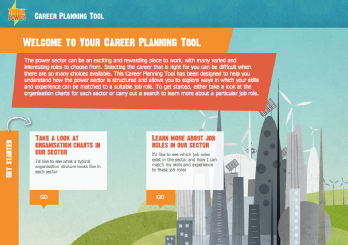Sources of careers information
In this section, we consider the use of careers information, what might constitute the 'right' careers information for different clients and look at the top sources of information for the energy and utilities industries.
 The use of careers information
The use of careers information
We saw in the introduction slide cast that careers information (including labour market information) underpins career decision making and thus careers advice and guidance.
We know that much careers research now takes place on the web, sometimes supported by online telephone or web chat support services, a development encouraged by Government policy. The use of the web as a careers information tool is developing rapidly and still holds much potential* (reference listed below). Consequently there is now clear recognition of the importance of digital literacy as a vital skill in web based career research. Despite the fact that the internet is an important source of information and communication to young people, the issue of digital exclusion is also a deep concern for those unable, because of lack of opportunity or skill, to take up the web offer**.
However exciting the web offer is, it would be wrong to discount the importance of the informal careers information people learn through their personal contacts, work experience, etc. Research over many years has confirmed that the most powerful careers influencers are family and friends (see ***). Peer to peer information and advice is encouraged on the web through online forums such as those on the National Careers Service website and online mentoring sites such as www.horsesmouth.co.uk
and online mentoring sites such as www.horsesmouth.co.uk
We need to support clients to take a ‘blended' approach to their career research – gather informal information and collect opinion, but check that important facts are up to date using formal online sources, then make their decision.
As individuals, we all have specific personal questions and areas of interest when researching a career. Frequently, for some, this can be a disappointing aspect of career research, particularly on the web, in that information is often very general and unable to answer particular questions, especially those relating to local circumstances.
Research**** has revealed that people seeking advice and guidance identified 6 broad areas of labour market information that they need to understand:
| Question asked | Area of Understanding required | So information should include |
| "How easy is it to get in to?" | The competition they face | The demand for labour |
| "How do I get into it?" | The entry routes | Trends |
| "What's the pay like?" | The rewards available | Progression routes |
| "Can I travel to this work easily?" | The availability of jobs in their 'travel to work area' | Geographical availability |
| "Could I get into this type of work?" | The prospects of securing employment in a particular job | Transferability of skills and qualifications |
| "Do employers accept this qualification?" | The value of particular qualifications, experience or training | How employers recruit and select |
|
Using the career planning tool |
 |
 Further information
Further information
* Careering Through The Web (UKCES, 2010)
(UKCES, 2010)
** Life Support Young people’s needs in a digital age (The Nominet Trust, 2012)
(The Nominet Trust, 2012)
*** Young People’s Job Perceptions and Preferences (Millward, Houston, Brown & Barrett, 2006) Table 19, page 58
(Millward, Houston, Brown & Barrett, 2006) Table 19, page 58
**** What is Effective Guidance? Evidence from Longitudinal Case Studies in England (Bimrose, Barnes, Hughes & Orton, 2004)
(Bimrose, Barnes, Hughes & Orton, 2004)
Time to move on...
 Move on to Good careers information?
Move on to Good careers information?
